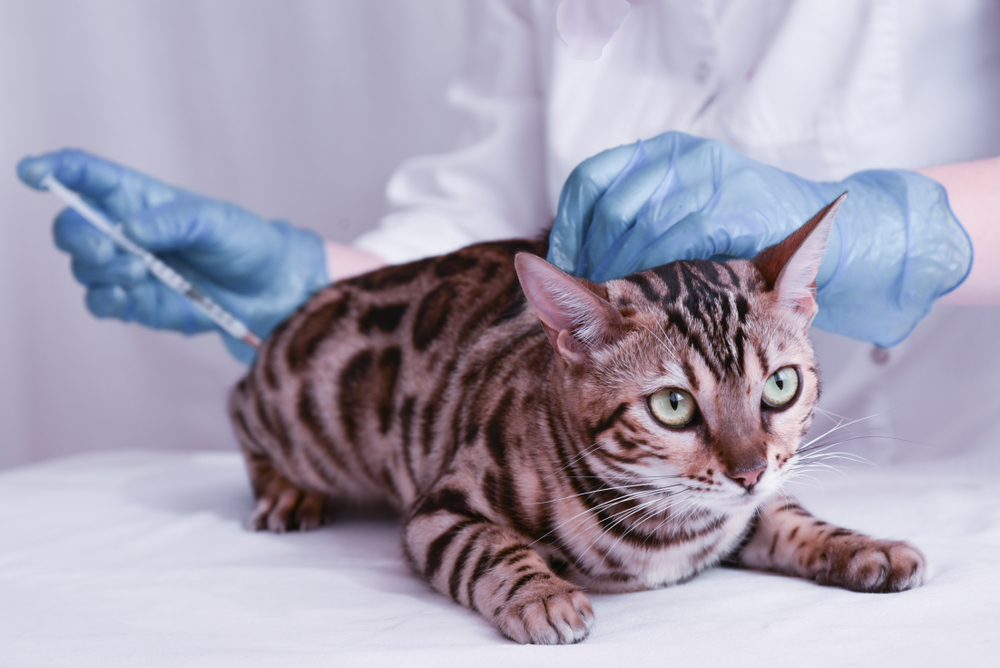Although respiratory infections in cats are often thought to be “kitty colds,” they can take a serious toll on your feline friend’s health. By learning how these infections spread, what illnesses they can cause, and how to prevent them, you can better protect and support your cat.
What causes respiratory infections in cats?
Feline respiratory infections can be caused by any number of pathogens, including viruses, bacteria, fungi, and protozoa. Most commonly, respiratory infections are caused by viruses, although secondary bacterial infections also can develop.
Roughly 90% of all feline upper respiratory infections (URIs) are caused by two viruses: feline calicivirus (FCV) and feline viral rhinotracheitis (FVR), also known as feline herpesvirus type 1. URIs caused by viral pathogens are highly contagious and spread like wildfire, especially in unvaccinated or crowded cat populations. Other pathogens also can be extremely infectious and easily transmitted via direct (e.g., mutual grooming, sleeping together) or indirect contact (e.g., contact with contaminated objects, surfaces, and people).
Sneezing is one of the most common ways URIs are transmitted. When an infected cat sneezes, pathogens are aerosolized. If a nearby healthy cat inhales the pathogens, they can become infected.
What signs will I see if my cat has a respiratory infection?
Although numerous pathogens are responsible for respiratory infections in cats, they generally cause similar signs. If your cat develops a URI, you may see:
- Sneezing
- Nasal discharge
- Nasal congestion
- Conjunctivitis
- Squinting
- Ocular discharge
- Wheezing or coughing
- Difficulty breathing
- Lethargy
- Fever
- Lack of appetite
- Oral ulcers
Are some cats more likely to get respiratory infections?
Any cat is susceptible to respiratory infections, but some cats have an increased risk. They include:
- Kittens
- Senior cats
- Cats with underlying diseases, like feline leukemia (FeLV) and feline immunodeficiency virus (FIV)
- Cats with weakened immune systems
- Brachycephalic cats (e.g., Persians, Himalayans, Burmese)
- Cats experiencing stress
Cats also can become lifelong carriers, particularly with FVR, where the disease falls into a dormant state, only to reappear in times of stress or illness. This is why shelter cats—who commonly have viral respiratory infections—become ill within a week or two of arriving in a new home. The stress from a new environment and routine taxes the immune system, allowing the virus to re-emerge and cause illness.
How would a respiratory infection be diagnosed in my cat?
Typically, URIs are diagnosed based on a physical exam and a history of clinical signs. Since the vast majority of URIs have viral causes, determining which pathogen caused the illness is usually not necessary, unless a sick cat fails to improve with supportive care.
How would a respiratory infection be treated in my cat?
Immune system support is key in helping your cat fight off a respiratory infection. Keeping them warm, fed, and hydrated is important, as is ensuring their eyes and nose remain free from discharge and crusting. Often, a sick cat fails to eat and drink because they cannot smell their food, so gently wipe away nasal discharge and heat up canned food to produce a stronger, more enticing odor.
If a bacterial cause is suspected, antibiotics are warranted. Otherwise, antiviral medications may be prescribed. Nasal drops are also beneficial for opening up nasal passages.
Does my cat need emergency care for a respiratory infection?
Typically, upper respiratory infections in cats do not require emergency care. However, kittens, senior cats, and cats with a chronic disease (e.g., FeLV, FIV) can suffer from more debilitating illness. Cats who develop oral ulcers also may struggle with staying fed and hydrated and may require a feeding tube and intravenous or subcutaneous fluids, in addition to pain medication, while they recover.
If your cat becomes especially lethargic, fails to eat, appears dehydrated, struggles to breathe, or seems to be worsening, contact our emergency services team.
How can I prevent my cat from getting respiratory infections?

Regular vaccination against viral causes of respiratory infections is crucial for keeping your cat healthy. Although the vaccinations are not always 100% effective, they can greatly reduce the severity of the infection.
Other ways to minimize your cat’s risk of contracting a respiratory infection include:
- Stress reduction
- Indoor-only environment
- In-home pet-sitting instead of boarding
- Regular preventive care to maintain good health
- Excellent hygiene
Although respiratory infections do not often develop into emergency situations, your cat may need veterinary assistance in breathing, eating, and recovering from a viral, bacterial, or compound infection. If you are worried about your cat’s respiratory illness, count on our Animal Care & Emergency Services team any time, day or night.







Leave A Comment